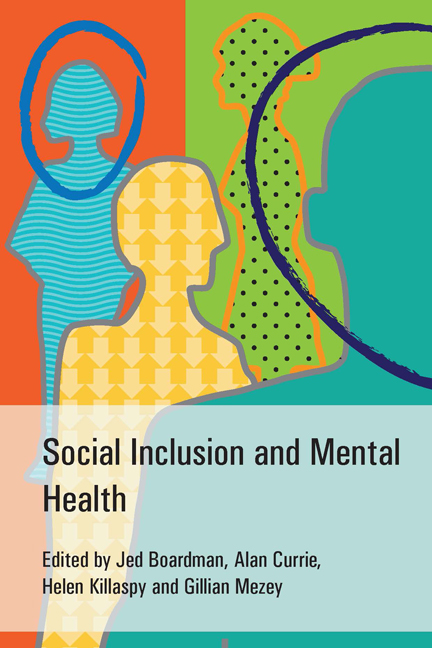Book contents
- Frontmatter
- Contents
- List of contributors
- List of tables
- Foreword
- Preface
- Acknowledgements
- Scoping Group on Social Inclusion, Royal College of Psychiatrists
- Part 1 What is social exclusion?
- Part 2 Social exclusion: the scope of the problem
- 7 The extent of disadvantage, poverty and social exclusion in the UK
- 8 How are people with mental health problems excluded?
- 9 Social exclusion in specific social groups and individuals with mental health problems
- 10 Social exclusion and people with mental health problems: developing a clearer picture
- 11 Finding acceptance: the experiences of people who use mental health services
- 12 Social inclusion from the carer's perspective
- Part 3 Working towards inclusive psychiatry
- Index
9 - Social exclusion in specific social groups and individuals with mental health problems
from Part 2 - Social exclusion: the scope of the problem
- Frontmatter
- Contents
- List of contributors
- List of tables
- Foreword
- Preface
- Acknowledgements
- Scoping Group on Social Inclusion, Royal College of Psychiatrists
- Part 1 What is social exclusion?
- Part 2 Social exclusion: the scope of the problem
- 7 The extent of disadvantage, poverty and social exclusion in the UK
- 8 How are people with mental health problems excluded?
- 9 Social exclusion in specific social groups and individuals with mental health problems
- 10 Social exclusion and people with mental health problems: developing a clearer picture
- 11 Finding acceptance: the experiences of people who use mental health services
- 12 Social inclusion from the carer's perspective
- Part 3 Working towards inclusive psychiatry
- Index
Summary
There seems no doubt that people with mental health problems are at risk of exclusion from many aspects of society, but it is also recognised that certain social identity groups are similarly at risk. In this chapter we examine the ways in which people with mental health problems who belong to these identity groups may be disadvantaged. In fact, they may be considered to be doubly disadvantaged, excluded by the nature of their ethnicity, culture or skin colour, their gender or sexual identity, or their faith and perhaps also by their mental health problems, or by the interaction of these characteristics. The idea of double disadvantage may be an oversimplification of the status of these groups – the disadvantage is unlikely to be straightforwardly additive – but it serves to illustrate the many ways in which disadvantage may operate. In addition, there are certain groups in society that are defined by their exclusion – prisoners, refugees and asylum seekers, the homeless – and the occurrence of mental health problems in these groups is higher than in the general population. They are excluded by their lack of liberty, lack of citizen status and lack of essential material needs.
Women with mental health problems
Women with mental health problems are especially vulnerable to exclusion in the areas of family activity and access to physical healthcare. Mental health problems are associated with the experience of domestic violence, which has an impact on social activity, income, leisure activities, and mental and physical health. Female mentally disordered offenders have particular problems.
Family activity
Women with mental health problems have as many children as those in the general population with the exception of women with schizophrenia and those with anorexia. The fertility rate for women with a diagnosis of schizophrenia is lower than that for other women (Howard et al, 2002). This is not fully explained by prescribed medication, especially as fertility is likely to increase with increasing use of atypical antipsychotics (Howard et al, 2002). Two-thirds of women with long-term psychoses have children (McGrath et al, 1999; Howard et al, 2001) and the majority describe motherhood as rewarding and central to their lives (Diaz-Caneja & Johnson, 2004).
The exclusion of many women with mental health problems is influenced by their increased risk of problems during the perinatal period and beyond.
- Type
- Chapter
- Information
- Social Inclusion and Mental Health , pp. 173 - 209Publisher: Royal College of PsychiatristsFirst published in: 2017



